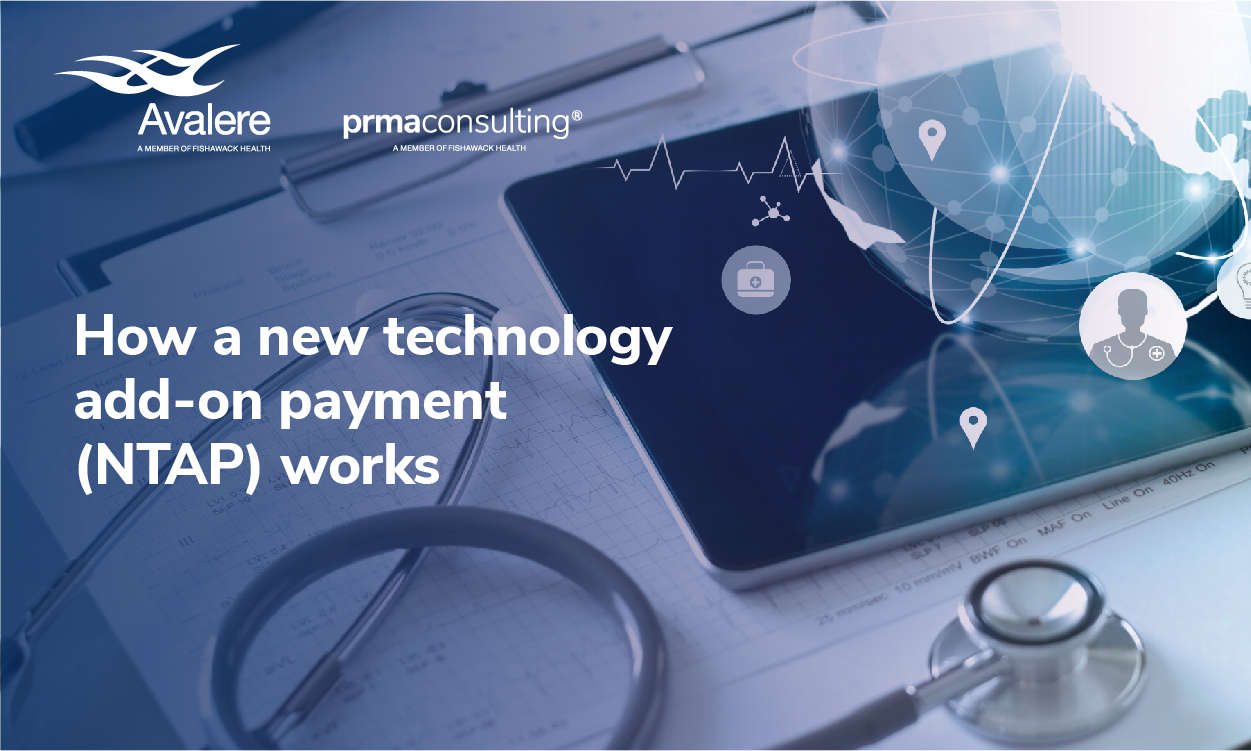Market access update
How a new technology add-on payment (NTAP) works

Additional Medicare payment options are available for new, high-cost technologies used in the inpatient setting–an update from Avalere Health, a member of Fishawack Health.
For an up-to-date look into new technology add-on payments (NTAPs) and the most recent proposed changes to this payment designation from the Centers for Medicare & Medicaid Services (CMS), please see our newest Insight on the Fiscal Year (FY) 2023 IPPS Proposed Rule.
Under the Inpatient Prospective Payment System (IPPS), Medicare pays for a patient’s inpatient hospital stay under a bundled payment, which covers all costs of acute care services performed. Examples of costs include those for room and board, operating room time, supplies, radiology, nursing, and laboratory services. Although this bundled payment covers most drugs, devices, and supplies, certain qualifying products are also eligible for additional payment via the NTAP designation.
For products that meet specified criteria, the CMS may provide additional payment. An NTAP designation enables additional payment to hospitals above the standard Medicare Severity Diagnosis-Related Group (MS-DRG) payment amount. A product’s NTAP designation lasts for no more than 3 years for a specific indication. Typically, a technology must meet 3 criteria to qualify for NTAP:
- Newness: A technology is considered new until claims data reflecting the use of the technology have become available (typically up to 3 years after Food and Drug Administration [FDA] approval). The technology must also not be “substantially similar” to any existing technology.
- Cost: The technology must be determined to be inadequately paid under the existing MS-DRG system, meaning that the average standardized charge for inpatients using the technology exceeds the cost threshold.
- Substantial clinical improvement: Use of the technology must significantly improve clinical outcomes for a specified patient population, compared with currently available treatments. Clinical data must be either specific to or generalizable to the Medicare patient population.
The CMS recently created alternative NTAP approval pathways for certain technologies. Devices that obtain breakthrough designation and drugs that obtain qualified infectious disease product designation from the FDA need only meet the cost criterion, because the CMS assumes that those products meet the newness and substantial clinical improvement criteria.
The NTAP application process takes place on an annual basis, where CMS reviews applications and decides whether or not to award this payment designation as part of its annual IPPS rulemaking cycle. NTAP applications for a given fiscal year are due the October before that fiscal year begins.
Having supported more than a dozen successful applications during the past decade, Avalere’s experts understand the NTAP process and can offer the following services to manufacturers:
- Provide an NTAP primer explaining the process, key internal stakeholder involvement, timelines, and case studies of successful, similar technologies
- Assess cost feasibility to determine a technology’s likelihood of meeting the cost criterion
- Assess a technology’s ability to meet the newness and clinical improvement criteria (e.g., by reviewing clinical evidence)
- Draft and submit the NTAP application, including the cost-threshold analysis
The NTAP application process – as shown in the FY 2023 timeline below – requires submission of the application in October. Given the cost analyses and clinical information required as part of this application, manufacturers should begin working on their NTAP applications now.
Table 1. FY 2024 NTAP application timeline
 a The New Technology Town Hall’s purpose is to present information regarding the clinical improvement criteria. As alternative pathway applicants only have to meet the cost criteria, these applicants need not attend the town hall.
a The New Technology Town Hall’s purpose is to present information regarding the clinical improvement criteria. As alternative pathway applicants only have to meet the cost criteria, these applicants need not attend the town hall.
b A comment letter may not be needed for those applying through the alternative pathway because the CMS will provide conditional approval of the NTAP in the IPPS proposed rule.
c The CMS is proposing utilizing National Drug Codes to identify NTAP eligible therapeutic agents beginning in FY2024. If finalized, non-therapeutic technologies applying for NTAP will be required to submit an ICD-10-PCS code request.
Connect with Avalere to learn from our NTAP and inpatient reimbursement expertise.
Avalere Health is a member of Fishawack Health’s Policy, Access, Value, and Evidence capability. Together with our colleagues in PAI, PRMA Consulting, and Skysis, we provide a best-in-class integrated offering from early pipeline to patient access.

FREE Ebook
Navigating the US payer landscape and the evolving influence of ICER
We respect your privacy. Cookie policy.
Latest insights


























